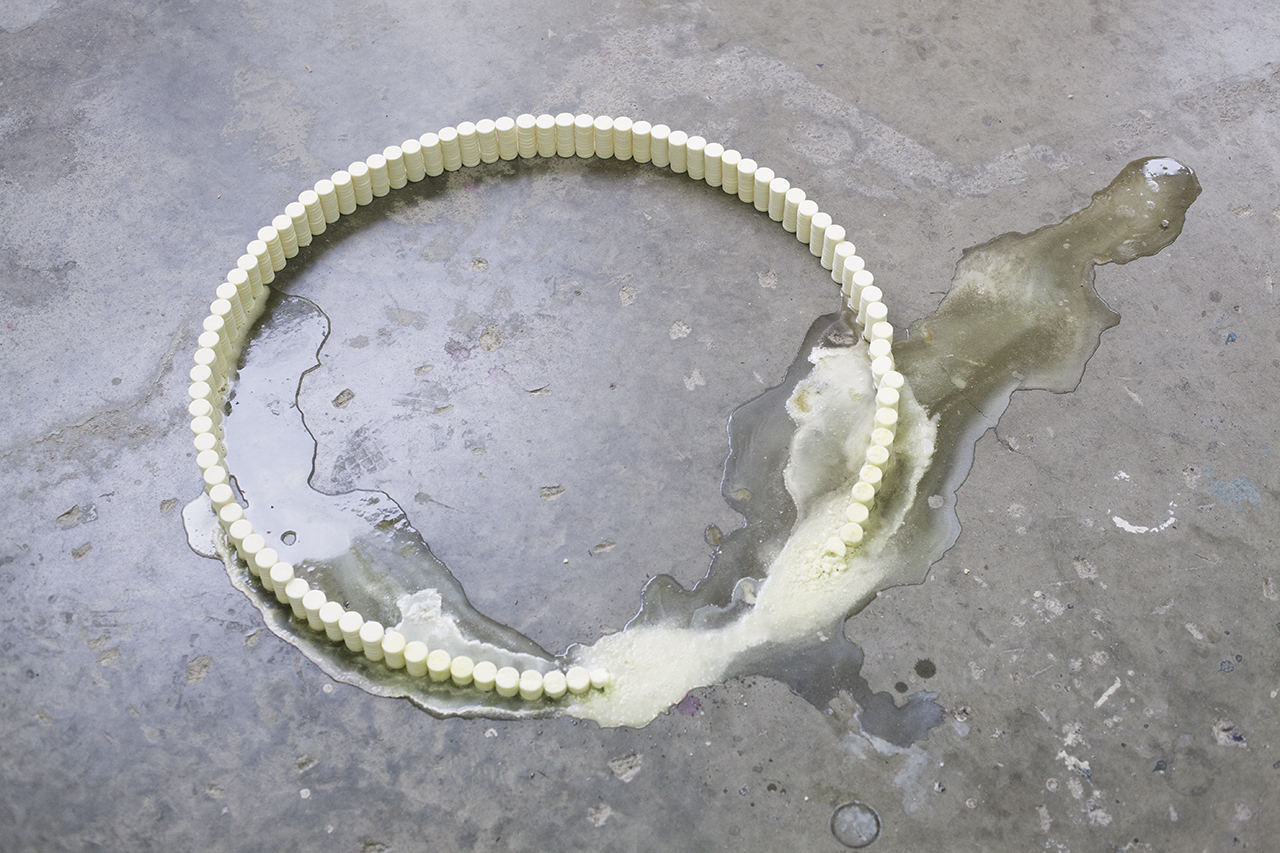Delusion / Energydrink / Vitamin
︎DE
Delusion
Delusion can arise from false convictions. Delusion is a state in which one cannot doubt its the truthfulness of one’s beliefs. In fact, such unfounded self-delusions can be observed in every human being. Everyone thinks, of course, that “tomorrow” will definitely take place. Everyone is planning something for the future, such as “Tomorrow I’ll buy a bike, and next week I’ll go on a trip”, etc.
Oh, how stupid it is to dream of the future. Nobody knows if tomorrow will really come, but we earn our money, save it, and plan with it. We pay money for our clothes, a home, and our health and for a non-existent future.
We live in an illusion. In my opinion, “forgetfulness” could be the opposite of “imagination”. “Forgetfulness” means forgetting something that actually happened, whereas “imagination” means “remembering” something that actually has not happened. Energy drinks are drunk in the hope of a future that may not take place and one exploits oneself for it, vitamins are then consumed for the overexerted “self”. I would like to say again: Every expectation comes from delusion.
Energydrink
Students sit deep in their work in front of the computers and switch them off at the last moment without saving the data. A young woman rides on the bus to avoid being late for work. She thoughtlessly throws her cell phone into her purse instead of money. Another woman is so tired at work that she doesn’t use lipstick but a glue stick on her lips...
This ridiculous TV commercial is followed by an advertising campaign with the title “Wake up, youth!” In Korea, energy drinks are consumed at night to avoid falling asleep and to be able to continue working or studying productively. Not only employees but also many pupils and students always havebig problems with fatigue and energy drinks are the only solution for them. According to an analysis of the sales of 154 convenience stores around universities, sales of energy drinks increased by 33.4% after the mid-term exams compared to last month.
The internet has a production method how to mix several energy sources and fatigue receptors in order to achieve a higher level of alertness during the mid-term exam.When I found out about the image of energy drinks in Germany, I was very surprised because it is so different from the one in Korea. When I see or think of the word “energy drink” the first thing that comes to mind is the image of dead-tired people. But in Germany, energy drinks are mostly consumed in order to be able to go crazy all night while partying.I also noticed this completely different meaning with the word “library”. Here you use “library” when you want to read books in a quiet room or borrow a particular book. But the library has a slightly different image in Korea. The library is a room in which you have to study very hard to pass a difficult exam.
In the library, you invest in your future and your life. So I had to think about these misunderstandings: When I chose an object for my work, I thought about the associated image and its metaphors. But it could be that another person associates the object with other images. Misunderstandings occur between cultures that often cannot be translated. A Complete understanding between individual people seems to me fundamentally impossible.


Vitamin
1) Vital + amine
Vitamins belong to a balanced and healthy diet. If they are not ingested in sufficient quantities, it
can lead to severe illnesses. However, the name “vitamin” is misleading because vitamins do not
necessarily consist of amines; however, this name has taken root in everyday language. In the
middle of the twentieth century, vitamin-conscious nutrition became socially recommended, and
vitamins became a lifestyle product. Since then, everything that contains vitamins has been
synonymous with healthy products. Sweets and snacks that contain vitamins are not that bad,
consuming drinks that “contain many vitamins” during breaks makes us feel good, and cosmetics
with a unique composition of many vitamins must make our skin glow again. Vitamins, as they
are used and consumed today, lead to a sufficient supply of vitamins, but instead of ACE juice,
fruit gnomes, and vitamin D tablets, a lemon, some vegetables, and a little time out in the fresh
air would do just as well. Vitamins are packaged and sold as if they make us younger and
healthier.


2) Fizzy tablets
“Effervescent medicinal beverages date back to the late 1800s and originally arose to mask the taste of bitter water taken as a curative, during the water cure craze of that era.” Yes, I’ve been using it right! As a Korean, I was not used to drinking carbonated water. I found the taste bitter and unenjoyable. Isolved this personal problem with effervescent vitamin tablets (lemon, grapefruit, and grape flavor)from drugstores.
I’ve always loved watching the process of a vitamin tablet disappearing into the water. The tablet is actually round in shape, but in water, it loses its perfect shape. The hard material turns into foam when immersed and after that, it no longer exists.
The transformation is always quite turbulent—after a while, it ends in silence. For me, the disappearance of what exists is a metaphor for life.
3) Panacea
Whenever I talk to my mother on the phone, she always asks me if I have taken vitamins regularly. She is concerned for my health, so she often tells me to eat well and take vitamins. Whenever I talk about having pain, tiredness or problems with something somewhere in my body, everyone suggests taking vitamins. Vitamin D was recommended to me when I felt depressed during the winter in Germany. But it sounds to me as if my depression is simply being devalued with such general suggestions. It seems that vitamins can cure all different diseases. Maybe you can get depressed because of a vitamin D deficiency, but not all depressed people can improve their condition just by taking vitamins.